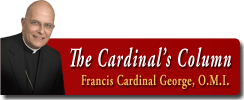Christians in the Middle East
Earlier this month I spent four days in Lebanon at the invitation of the Catholic Maronite Patriarch of that country. Four days is not a very long time to visit a country as complex as Lebanon, even though it is geographically limited to an area approximately l25 miles long and 35 miles wide. Lebanon occupies the territory of ancient Phoenicia. It has been inhabited as long as any place known to us and includes the biblical cities of Tyre and Sidon. Today its territory is home to Maronite and other Eastern Catholics, Orthodox Christians, Sunni and Shiite Muslims and Druze. There are camps of Palestinians in the south of the country and hundreds of thousands of Syrians throughout the country, which contains about four million people.
Because my visit was well planned by those who invited me, including Father Victor Kayrouz, pastor of Our Lady of Lebanon Parish in Hillside and Father Faouzi Elia, pastor of St. Sharbel Parish in Peoria, I was able in a short time to talk to many people, not only bishops and some of the Catholic faithful, but also the leader of the Druze community, the Grand Mufti of Lebanon, the U.S. ambassador, the president of the country and members of the government. I was there to listen and try to understand and to express the support of the Catholic bishops’ conference of this country for the Maronite Catholics of Lebanon.
The situation of Lebanon is not only complex but precarious. The economy has not yet succeeded in recovering from the disastrous civil war of 1974-1990. The internal pact among the different faiths risks being undone by increasing emigration, especially of the Maronite Catholics. The peace of the country is threatened by the entire situation in the Middle East and the unintended effects of the war on terrorism. The importance of Lebanon is magnified by its being the only country in the Middle East with a significant Christian population. Its history, despite conflicts of all sorts, makes Lebanon not just a country but a message: with considerable self-sacrifice, people of different faiths truly can live together over many centuries. At the end of my visit, I promised that I would speak of Lebanon when back in the United States and ask for prayers for its peoples.
I was deeply grateful in Lebanon to see again how differences of national background, culture, race, class and gender are gathered up and preserved in the one, holy, catholic and apostolic Church. The unity of the Church is established everywhere by the one God, through the one mediator, Jesus Christ, in the power of the Holy Spirit. In Lebanon, as in the United States and around the world, the Church comes to be through one baptism, with her members sharing one faith. The Church is nourished and expressed through her celebration of one Eucharist. At Mass in Lebanon on Sept. 15, Maronites, Syrians, Armenians, Chaldeans and Latins all professed the same creed from the first Ecumenical Council of Nicaea (325 A.D.), the creed we recite in every parish of the Archdiocese each Sunday. All these gifts from God, gifts of faith and sacraments and the pastoring of bishops in apostolic succession with and under the successor of Peter, create the relationship we call Catholic communion. Living in this communion is to be related to and to share in the life of Father, Son and Holy Spirit, both here and in eternity.
This visible Catholic communion has, in recent decades, shrunk considerably in numbers throughout the Middle East. Other Christian communities are also much diminished. The Holy Father has often expressed concern that the lands which have harbored communities of Christians since the time of Jesus himself will soon become merely places of pilgrimage by foreign Christians, with no local Christians to welcome them. There are a number of agencies which support schools and parishes in the Middle East, especially in the Holy Land. They also give emergency assistance, food and housing and medical assistance and work to create jobs in the current crisis. This help enables people to stay in their homeland rather than emigrate. Those interested in helping can contact the Catholic Near East Welfare Association (1011 First Ave., New York, N.Y. 1022-4195); the Holy Land Christian Ecumenical Foundation (P.O. Box 5587, Silver Spring, MD 20906); Catholic Relief Services (P.O. Box 17090, Baltimore, MD 21203-7090); the Franciscan Foundation for the Holy Land (1400 Quincy St., NE, Washington D.C. 20017); the Order of the Holy Sepulchre of Jerusalem, here in Chicago or in other cities; and the Knights of Malta, also here in Chicago but with their international headquarters in Rome. All of these organizations have long histories in the Holy Land and the Middle East. Each is effective in bringing help to Christian groups increasingly worried about their future and tempted to lose hope.
Finally, the lives of Christians anywhere are marked by hope. The Synod for Lebanon of a decade ago, called to review the situation of the Church in that country, took as its theme the renewal of hope. The Synod gave a name to that hope, a name both ancient and ever new: Jesus Christ, Son of God and Son of Mary. In the hope he brings, we who are his disciples are to work for peace and reconciliation in our own country and around the world. God bless you.
Sincerely yours in Christ,

Francis Cardinal George, OMI
Archbishop of Chicago
Top
Back to Archive 2002


